Highlights and video of the online event: '25 years of EuroVelo'
With over 550 registrations, the EuroVelo community flooded the online chat room with messages and well-wishes, all the while creating an engaging discussion throughout the two-hour event, which was filled with insightful presentations and panel discussions.
Watch the recording of the online event below.
“25 Years of EuroVelo – Laying the foundations for cycling tourism in Europe” was a moment to reflect on the achievements of EuroVelo over the past years and to focus on the future development of the European cycle route network, along with its potential to become a vector for more cycling tourism in Europe. The event was opened by ECF President, Henk Swarttouw who in his welcoming address stressed that while EuroVelo is one of the European Cyclists’ Federation’s (ECF) flagship initiatives, its development would not be possible without the collective effort and cross-border cooperation of an extended network of partners across the continent, from National EuroVelo Coordinator Centres (NECC) to European institutions. He also stressed that the latest study on the impact and potential of cycling tourism in Europe was from 2012, and how ECF is actively searching partners to develop a new, much-needed study.
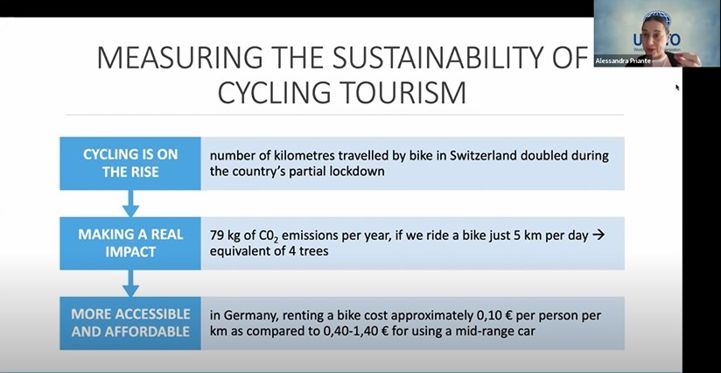
Camille Thomé, Director of Vélo & Territoires (our French NECC) and member of the ECF Board and EuroVelo Council was our special host for the day, saying a few words on the importance of EuroVelo before introducing the first keynote speaker, Alessandra Priante – Director of Europe at the United Nations World Tourism Organization (UNWTO).
“In 2019, we were in a turmoil where destinations were saying that we were too many. Cycling tourism is so important in the de-seasoning and the decongestion of main attraction tourism spots – spreading visitors and the economic impacts of tourism,” said Priante, before stressing that cycling tourism, especially when paired with rail, has a massive potential to boost tourism as a driver for rural development. One of the core pillars of the responsible recovery of the tourism sector is rural development and cycling tourism has an important role to play in this.
Priante was then followed by Valentina Superti, Director of Ecosystem II: Tourism & Proximity at DG GROW, who elaborated on the importance of cycling tourism for Europe. “EuroVelo is part of the picture from a political point of view and supports European policies,” explained Superti. “Tourism represents over 10% of the EU's GDP. Cycling must be part of its future, and it already has a positive effect on local economies.”
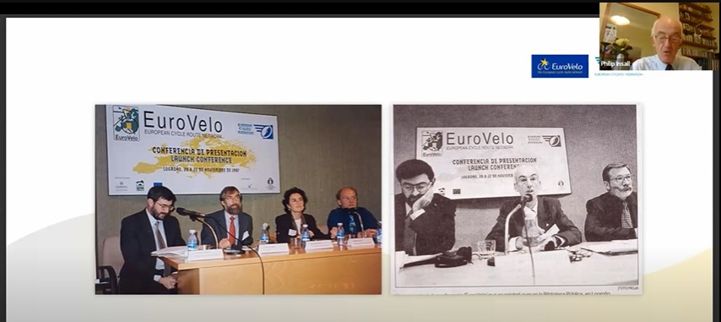
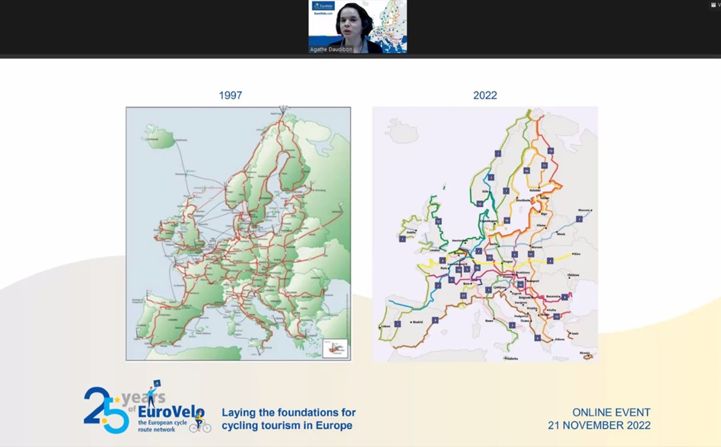
Needless to say, the online event was the perfect occasion to reflect on the history and the future of the European cycle route network, as well as the potential of the network to promote more cycling mobility and cycling tourism in Europe. These topics were addressed in a panel discussion moderated by Alex Crevar, travel journalist, editor, and consultant. Philip Insall, former Director of Health and International at Sustrans and member of the initial EuroVelo working group, discussed with Agathe Daudibon, EuroVelo Manager at ECF.
Insall recalled that the importance of including EuroVelo into TEN-T was already a topic at its inception, elaborating further on the initial vision and network partnerships during its launch event in Logroño back in 1997. Agathe Daudibon then shared EuroVelo’s 2030 Strategy: “Our vision for 2030 is a fully developed and high-quality cycle route network”. Currently, the network is 64% developed, with over 35,000 km of EuroVelo signs in 24 European countries.
The following session featured the presentation of the EuroVelo Data Hub. Holger Haubold, Director of Intellectual Property and Data Collection at ECF presented the newly published menu to access the data hub on EuroVelo.com. He also shared the latest digital statistics figures for the EuroVelo web and social media platforms – more information about route development and network usage is available on the EuroVelo Data Hub.
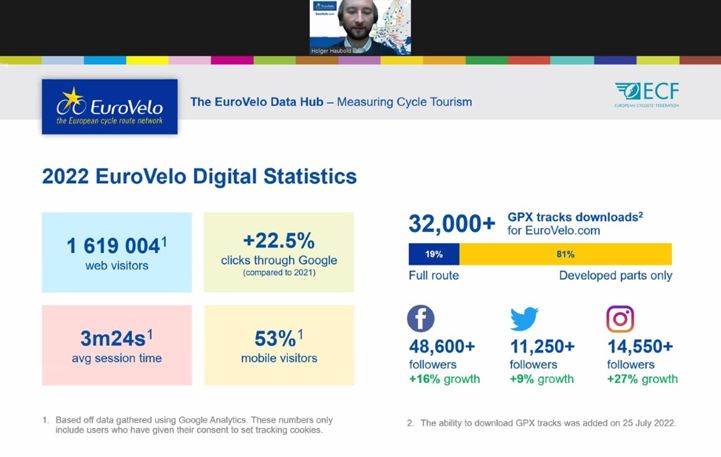
Next was Enrico Durbano, CEO of Eco-Counter, who presented the latest data on the EuroVelo cycle route network. The usage of EuroVelo routes in 2022 (compared to 2019) increased notably, with a 14% increase during weekends and an 11% increase overall. EuroVelo 17 – Rhone Cycle Route saw an incredible 34% growth in cyclists!
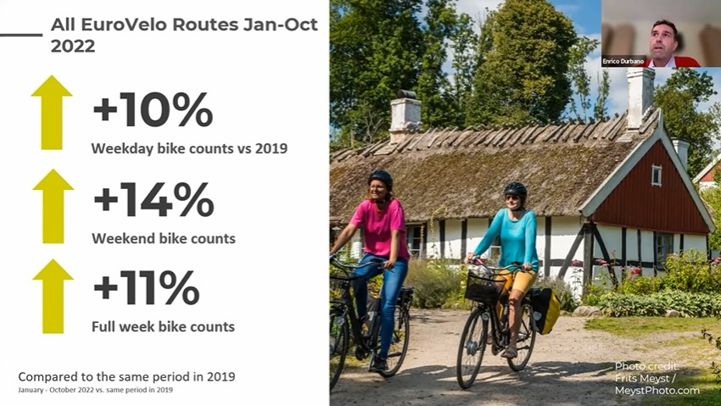
The presentations were followed by a dedicated panel discussion on data moderated by Holger Haubold with case studies from France, Germany, Hungary and Spain.
Stéphanie Mangin from Vélo & Territoires explained the ÉVA-VÉLO methodology to monitor cycling tourism and evaluate its economic impacts, explaining,
"Cycling data from France show that 50% of cyclists are tourists; cycling tourism has had a €4.2B economic impact; there has been a 17% increase on #EuroVelo routes in France (2021/2019).”
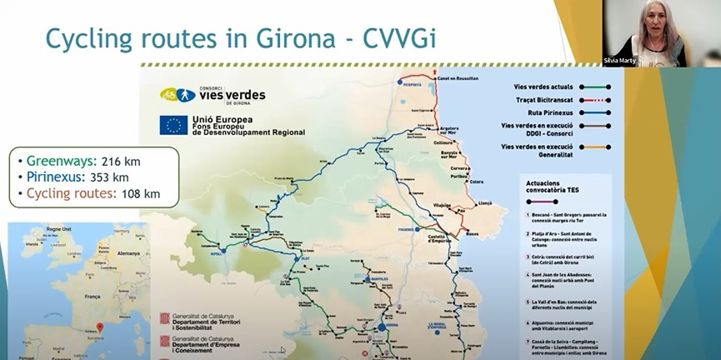
Frank Hofmann, ADFC and EuroVelo Council Member, presented ADFC’s marketing initiatives and the Bicycle Travel Analysis 2022. “There were 3.9 million cycling trips in Germany in 2021, this accounted for 12% of tourism in the country and generated €12B in turnover.”
Miklós Berensci, from the Centre for Development of Active and Ecotourism (Hungarian NECC), shared the different ways cycling tourism data is being collected in Hungary and the steps to improve the monitoring on a national and EU level.
Silvia Marty of Vias Verdes de Girona was the final panelist of the “Data Session”. She presented the cycling data on a section of EuroVelo 8 – Mediterranean Route in Girona, Spain. In terms of direct economic impact, the region generated €3.4 million thanks to the greenways!
The last keynote speech came from the Irish MEP Ciarán Cuffe. He discussed the positive impact of EuroVelo and its network on European transport and mobility, stating, “Let's hope for a strong and united message in the EU Parliament for this cycling revolution.”
In his speech, Cuffe also claimed that the “moment” for cycling tourism is here and that EuroVelo needs to ideally become part of the EU's transport network, TEN-T.
For the last section of the online event, Camille Thomé announced that Izmir, Türkiye has been selected as the host city for the EuroVelo & Cycling Tourism Conference 2023. Connecting from Türkiye, Ceylan Şensoy of TGA invited everybody to continue the discussion on 11-13 October 2023 at the EuroVelo & Cycling Tourism Conference in Izmir, the beautiful coastal city situated on EuroVelo 8 – Mediterranean Route.
In a year which has already seen the launch of GPX tracks for EuroVelo routes in the summer and the EuroVeloForYouth campaign in the autumn, the 25 Years of EuroVelo – Laying the foundations of cycling tourism in Europe – online conference was the perfect opportunity to promote and celebrate such a milestone.
ECF wants to thank all the speakers for their insightful presentations and engagement during the event and express its gratitude to all the participants who joined to celebrate this important achievement towards #MoreCyclingTourism!
Author: Marta Orihuel